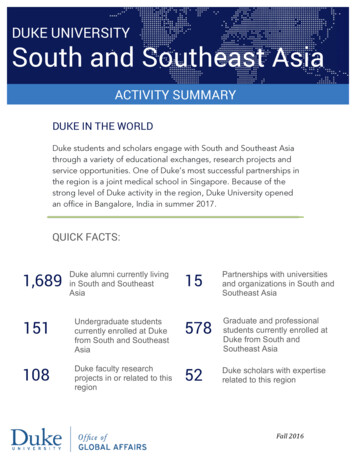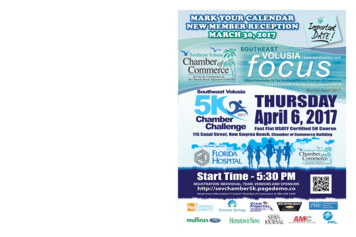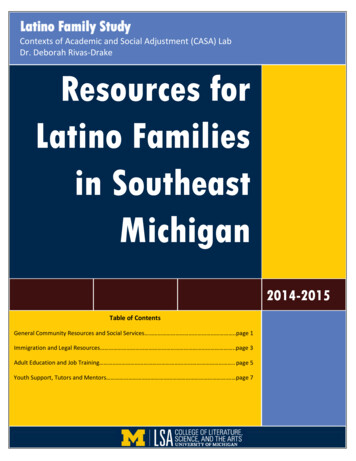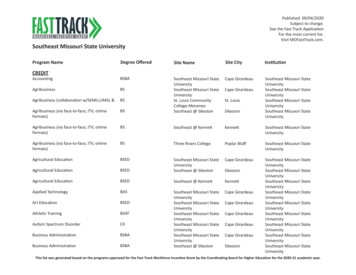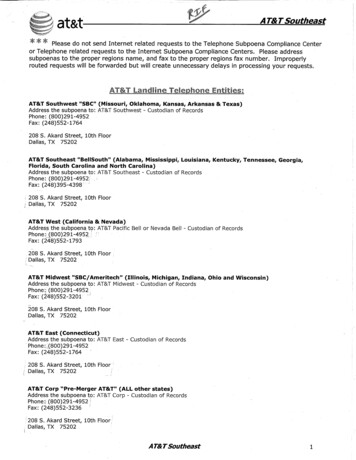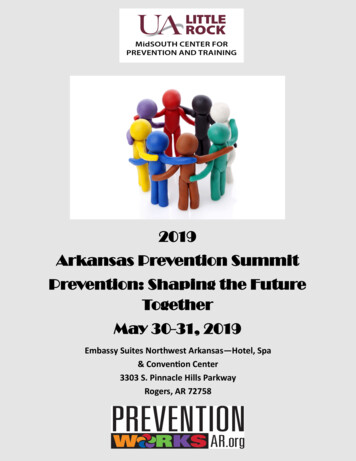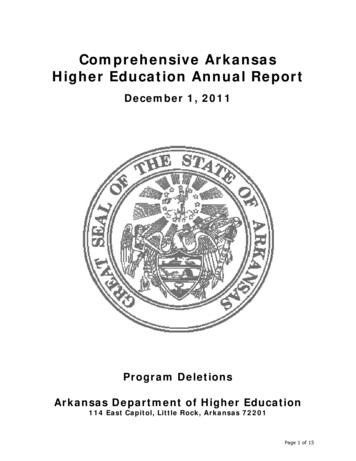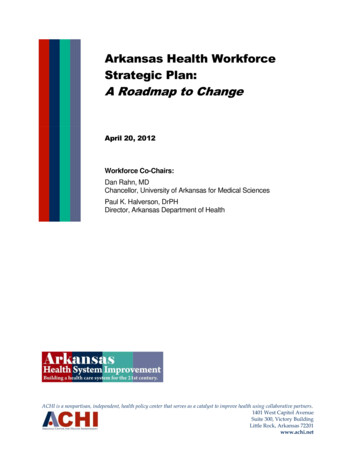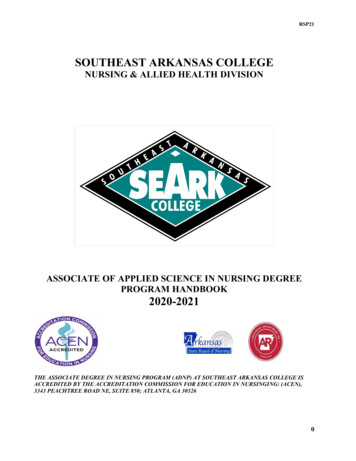
Transcription
RSP21SOUTHEAST ARKANSAS COLLEGENURSING & ALLIED HEALTH DIVISIONASSOCIATE OF APPLIED SCIENCE IN NURSING DEGREEPROGRAM HANDBOOK2020-2021THE ASSOCIATE DEGREE IN NURSING PROGRAM (ADNP) AT SOUTHEAST ARKANSAS COLLEGE ISACCREDITED BY THE ACCREDITATION COMMISSION FOR EDUCATION IN NURSINGING: (ACEN),3343 PEACHTREE ROAD NE, SUITE 850; ATLANTA, GA 303260
RSP21TABLE OF CONTENTSOrganizational ChartsSEARK College .3Division of Allied Health .4Associate of Applied Science in Nursing .5Welcome to SEARK Department of Nursing4Introduction 5Program Philosophy Mission and Vision . .6End-of-Program Student Learning Outcomes . .10ADN Program Outcomes . 11College Student Learning Outcomes .11Organizing Framework 12Program Definitions .13Program Curriculum .15Student PoliciesAdmission . . .16International Student Admission . .17Academic Progression . 19Graduation .19Challenge/Transfer Student Policy 20Returning Student Policy .20Academic Appeals (Grading Petitioning) .21Student/Faculty Disputes . .22Health Services .22Changes: Name, Address, Telephone, Email 22Student/Faculty Disputes .22Health Services .22Address Changes .22Testing Policy . .231
RSP21Exit Exam Policy . .23Communication .24Uniform Policy .25Safety Policies . 26Instructor Responsibilities 29Student Conferences . . .30Progressive Discipline Policy 30Positive Progressive Discipline .31Classroom Guidelines .32Distance Learning Policy .33Technology Requirements .33Social Media Policy .33Student Conduct .34Student Orientation to Clinical .34Dress Code 34Computer/Audio Visual Usage . .34Messages 35Parking .35Student Accidents .35Faculty Advisors .36Attendance .36Grading Scale . . . .37Functional Ability Requirements . . .37Disability Statement . . .38Student Work Policy . . .38HIPPA Statement . .38Criminal Background Check and Drug Screen . .39Substance Abuse Policy . .39Testing Procedures .40Testing for Cause 41Confidentiality 422
RSP21Treatment, Referral and Reapplication . 41Nursing and Allied Health Skills Lab Guidelines . 43Student’s Fact Form .46Substance Abuse Policy Release Form . 48Program Fees . 49Nurse Practice Act 51Authorization to Perform Criminal Background Checks . . .54Signature Confirming Receipt and Understanding of Student Handbook. .55Authorization To Release Information /Signature Sheet . .56Social Networking Policy 573
RSP214
RSP21SOUTHEAST ARKANSAS COLLEGEDivision of Nursing & Allied Health Technologies Organization Chart*Denotes - Funded Part timeNursing & Allied Health TechnologiesDivisionDean of Nursing & Allied Health (NAH)Joyce ScottChairNursing & Allied HealthScott GannAdministrative SpecialistDora Jones, Administrative Specialist II*Deborah Domineck, Administrative Specialist IIPractical NursingKatharine McCoy-Director/InstructorTBA/ InstructorTerri Morton/ InstructorSherri Hargraves/InstructorRegistered Nursing:LPN To RN/ Generic Option:Kesha McCree-Director/InstructorMary Davis, InstructorBelinda Vagts, InstructorEmergency Medical TechnologyScott Gann- Director/InstructorTBA- Clinical Coordinator*Simulation Lab DirectorLatasha Hall- Simulation SpecialistHealth Information Mgmt.*Theresa Horton-Instructor*Joel Cobb- InstructorRespiratory Care TechnologyJanelle Smith-Director/InstructorLekita Pounds- Director of Clinical Education*Don Richter, Clinical CoordinatorSurgical TechnologyBrandy Sloan-Director/InstructorAnthony Long- Clinical CoordinatorNursing AssistantSheila Brown- Coordinator/InstructorPhlebotomy TechnologyDelores Evans- Director/InstructorJasmin Wells- InstructorMedical Coding/Medical BillingCarrol Hollinger- InstructorRadiologic TechnologyTina Pierce- Director/InstructorTommy Nix, Instructor* Dorothy Ritchie, *Terry Branson5
RSP21SOUTHEAST ARKANSAS COLLEGEDEPARTMENT OF NURSINGDear Nursing Students:Welcome to Southeast Arkansas (SEARK) College’s Nursing & Allied Health (NAH) Division.The faculty and I are very pleased to welcome you to SEARK’s Associate of Applied Science RNDegree Program. You are entering a profession that is life-changing, exciting, rewarding, and onethat will provide countless career opportunities.The Associate of Applied Science RN Degree Program is designed to meet the learning andsocialization needs of individuals who have some fundamental knowledge and skills that areapplicable to professional nursing. It is expected that every learning experience will expand andcompliment your current practice while assisting you to develop new knowledge and skills requiredfor the Associate of Applied Science Degree Nurse (ADN).This program enables qualified applicants who have computer and technology experience andaspire to become Registered Nurses to do so within a minimum duplication of course content andcredits. Students can complete all program theory courses and attend clinical during scheduledhours.The faculty are dedicated to developing and providing educational experiences that will assist youin reaching your goal of becoming an Associate Degree Licensed Registered Nurse. Only throughour combined effort will your goal be achieved. The opportunities for learning are available; it isyour responsibility to seize them.This Department of Nursing Handbook provides an overview of policies and procedures thatgovern student activities in the Associate Degree Nursing Program. It is your responsibility to readand become familiar with the policies that are described herein. I n addition to policies in thisHandbook, students are expected to follow the SEARK College Catalog/Student Handbook,Nursing and Allied Health Program Division Policies and clinical practicum agency policies.We extend best wishes for your success at Southeast Arkansas College and within the profession ofNursing.Joyce Scott, MSN, RNDean for Nursing & Allied Health6
RSP21SOUTHEAST ARKANSAS COLLEGENURSING HISTORYThe Nursing & Allied Health Division (NAH) is one of the three (3) instructional divisions ofSEARK College. The Associate Degree Nursing program is administered under the NAH division.On January 13, 1999 the SEARK College Board of Trustees voted to approve the development ofthe Associate of Applied Science Degree in Nursing – LPN/LPTN to RN Transition program. OnFebruary 11, 1999, the Feasibility Study for the establishment of the new program was submitted tothe Arkansas State Board of Nursing (ASBN). The ASBN approved the feasibility and granted Prerequisite Approval for the program on May 27, 1999. The program received approval by theArkansas Department of Higher Education Coordinating Board at its regular meeting on July 23,1999.On August 6, 1999, the proposal in partial fulfillment of the Arkansas State Board of Nursing(ASBN) requirements for Program Initial Approval was submitted. The ASBN granted InitialApproval to the program on January 12, 2000. A class of nineteen (19) students was admitted tothe program on June 5, 2000. On February 1, 2001, the ASBN reviewed the program to verifycompliance with minimum standards for Full Approval. The National League for AccreditationCommission (NLNAC) also reviewed the program in February, 2001, for compliance with thestandards for Initial Accreditation. On May 19, 2001, the ASBN voted to grant Full Approvalstatus to the program. On July 11, 2001, the NLNAC granted full Accreditation to the program.On September 23, 2009 the ASBN approved acceptance of Nationally Registered EmergencyMedical Technician Paramedic (NREMT-P) to begin June 2009.On September 9, 2010 the ASBN approved the college’s request to add a Generic Option to theexisting LPN/Paramedic-to-RN degree program. The Generic Option received accreditation by theNLNAC on November 15, 2010.In the Spring of 2015, and LPN/Paramedic to RN online program option was approved by theASBN and ACEN. Due to the lack of qualified instructors with online teaching experience, theprogram is currently inactive.7
RSP21ADNP PHILOSOPHYThe Associate of Applied Science Degree in Nursing (ADN) program is administered within theDivision of Nursing and Allied Health (NAH). The ADN program embraces the philosophy,mission, purposes, and values that have been set forth by the College. The NAH programs are vitalto providing technical career education and workforce development for the citizens of SEARKCollege’s service area. The ADN curriculum, content and learning activities are based on the five(5) competencies delineated in Health Professions Education (IOM, 2010). Patient-centered care (AKA - Person, Client, Individual, Family)Teamwork and CollaborationEvidence-based PracticeQuality Improvement/SafetyInformaticsMISSION STATEMENTThe Mission Statement communicates the essence of Southeast Arkansas College as the measuringstick for organizational and student success: “SEARK College will build a community of lifelonglearners committed to becoming the leaders of tomorrow.” We take our mission seriously – ourstudents of today will become tomorrow’s agents of change.VISION STATEMENTVision entails the ability to both look and plan forward—to recognize what is now, to seewhat is immediately ahead, and to create what will become the future. Our vision statement isour commitment to inspiration: “Empowering students . . . changing lives.COLLEGE VALUESThe College respects the diversity of the student body and recognizes the individualworth, dignity, and potential of each student. At SEARK College, recognition of the importanceand contributions of each faculty member, staff member, and student collectively creates apositive synergistic learning environment. Faculty, staff, and students have the opportunity toenhance their potential for purposeful, gratifying, and productive lives. The College affirms thefollowing values and beliefs in a conscious effort to guide the environment of the college for thebenefit of the students, employees, and the community.SEARK’s core values guide its internal conduct, as well as its relationship with the outside world,declaring what the College holds sacred: Students: The reason we exist Safety: Providing a safe and secure learning environment Integrity: The standard of always doing what is right8
RSP21 Authenticity: Being genuine and honest in our daily activitiesInnovation: Expanding our world and refusing to simply maintain the status quoDiversity: Our diversity in mind, body, and spirit is our strengthTransparency and Communication: Our institution is transparent, and communication isrecognized as a vital component of how we conduct our businessThe nursing faculty believes competency in these core areas must be achieved as a basis forproviding holistic care, deserved by all clients. Client-centered care supported by a growing bodyof evidence is at the center of the nurses’ ability to provide high quality, safe, and cost-effectivecare. Respect and relationship between the nurse and client are necessary for trust to develop andcontribute to more positive individual experiences and better health outcomes.The faculty believes that health occurs in a broad context of life entailing the physical,psychosocial, cultural, spiritual, and sexual needs experienced by the client while in constanttransition across the life span. Assessing growth and development stages will assist the nurse inplanning care that is age-specific and pertinent to meeting the needs of clients across the life span.Client needs are addressed by the nurse in a hierarchical order based on Abraham Maslow’sTheory. Life sustaining needs must be met before gratification of the higher psychosocial needscan be addressed. Only when basic needs are met can the client seek fulfilment of self-actualizationneeds.The body of knowledge regarding the nursing profession is supported by research within theprofession, as well as principles and theories of other disciplines. The nurse maximizes the healthexperience of the client through employing clinically competent evidence-based caringinterventions which promote, maintain, and restore health and prevent illness. While nursingpractice focuses primarily on assisting with life, the profession recognizes the need to supportclients through end-of- life care fostering dignity and peace.High quality care is designed through and achieved by coordination and collaborating with theindividual, family and the interdisciplinary team, thus ensuring engagement and sharedaccountability for the continuity and quality of care outcomes. The client goals for healthcareoutcomes should be identified and taken into account as the nurse provides care. These goals areprioritized throughout the plan of care. Client-centered care requires respect for the client’sexperiences, values, and preferences which are identified through ongoing assessments by the nurseand care team in collaboration with the client and family.The client’s internal and external environments impact how they perceive and respond to changes inhealth. A safe environment is one with the absence of internal or external threat or danger oropportunity for error. The ADN’s actions are critical in reducing errors and improving clientsafety. Assessing, monitoring, and providing therapeutic interventions are within the rolesidentified for the ADN (Provider, Manager, and Member of the profession). The incorporation of9
RSP21technology, shared decision making and communication skills to advocate for change in theclient’s internal environment (stress & adaptation) or the health care environment is critical tominimizing and/or alleviating physical, psychosocial, cultural, spiritual and sexual threats to health.The faculty believes that achievement of these core competencies is evidence that the ADN isequipped with the clinical decision-making skills, critical thinking, clinical judgment, and a level ofaccountability required to function autonomously as well as interdependently in collaboration withthe health care team.The faculty believes that practice of nursing is operationalized through application of the nursingprocess- a deliberate five-step method through which the ADN makes decisions and carries outtherapeutic (caring) evidence-based nursing practice. The nursing process is fluid and adaptable tomeet the client’s individual health care needs and circumstances. Caring is at the core of the nurseclient relationship resulting in therapeutic outcomes. The ADN can assist clients through thedevelopment of skill proficiency, interpersonal relationships, and the use of communication skills.Informatics enables the ADN to communicate within the interdisciplinary team, and also manageknowledge, mitigate errors, and support decision-making. The faculty believes that competence innursing practice is evidenced through meeting the ADN program objectives.TEACHING and LEARNINGThe SEARK College nursing students are adult learners and therefore motivated to learn when thecontent is relevant and useful in their work and/or personal lives. The nursing students have a widevariety of experiences as well as limited knowledge of the art and science of nursing. The facultybelieves that learning will be enhanced by a curriculum that builds on and strengthens thisknowledge. Through incorporation of online technology as a teaching methodology, the needs ofstudents are considered in the teaching learning process. Everyone has the capability to learn,which is influenced by one’s physical and intellectual capabilities, prior experiences, readiness tolearn and motivation.Teaching-learning must incorporate the principles of informatics and adult learning and is bestwhen it is an interactive process allowing the learner to formulate and apply concepts on acognitive, psychomotor, and affective level. We believe that faculty is responsible for structuringlearning experiences and serving as role models and facilitators. Structured and simulated learningexperiences are developed regarding the learner’s needs and abilities while facilitating thedevelopment of their potential. The learner internalizes these learning experiences, which assist inthe attainment of their potential through actively participating in progressively planned face-to-face,online academic, laboratory, simulation, and clinical experiences.10
RSP21We assert that learning is a lifelong process, evidenced through a change in behavior. We believethat learning is most successful when both the learner and teacher have a mutual commitment andwhen the learner perceives relevance of the content to everyday life.EDUCATIONThe faculty believes that education has as its goal to provide the learner with exposure to variedexperiences that facilitate growth of the total person. According to evidence- based practices, faceto-face and online education are effective methods for meeting the individual needs of learners.Online learning enhances the traditional classroom education. Educational experiences should begratifying and enhance the life of the learner. As a result of the integration of academic andtechnical education into the learning experience, both general and technical education becomesmore relevant and thus prepares the learner to enter the workforce with an entry level ofcompetence as an ADN.The Associate of Applied Science Degree in Nursing (ADN) program is administered within theDivision of Nursing and Allied Health (NAH). The ADN program embraces the philosophy,mission, purposes, and values that have been set forth by the College. The NAH programs are vitalto providing technical career education and workforce development for the citizens of SEARKCollege’s service area.NURSING EDUCATIONThe faculty believes that nursing education is the process whereby the learner is introduced to theresponsibilities and roles of the ADN (provider of care; manager of care; and member of theprofession of nursing) and standards which guides and governs the practice of nursing. We believeonline technology is a viable method for educating nurses in today’s society. We also believe thatthe educational experiences offered should build in complexity from fundamental core nursingskills and knowledge to a level of competence reflected in the end-of-program student learningoutcome (EOPSLO). The fundamental knowledge level of the learner should be assessed andaccommodated through a curriculum that offers upward mobility and options that meet and bridgethe needs of the learner. The program curriculum uses the concepts of the client, health,environment, nursing process, caring, communications, teaching/learning, and professionalism/rolesas the framework for organizing theory and practical experiences in acute and community settings.These concepts are progressively integrated across the curriculum to assist the learner in thedevelopment of a conceptual
On January 13, 1999 the SEARK College Board of Trustees voted to approve the development of the Associate of Applied Science Degree in Nursing – LPN/LPTN to RN Transition program. On February 11, 1999, the Feasibility Study for the establishment of the new program was

